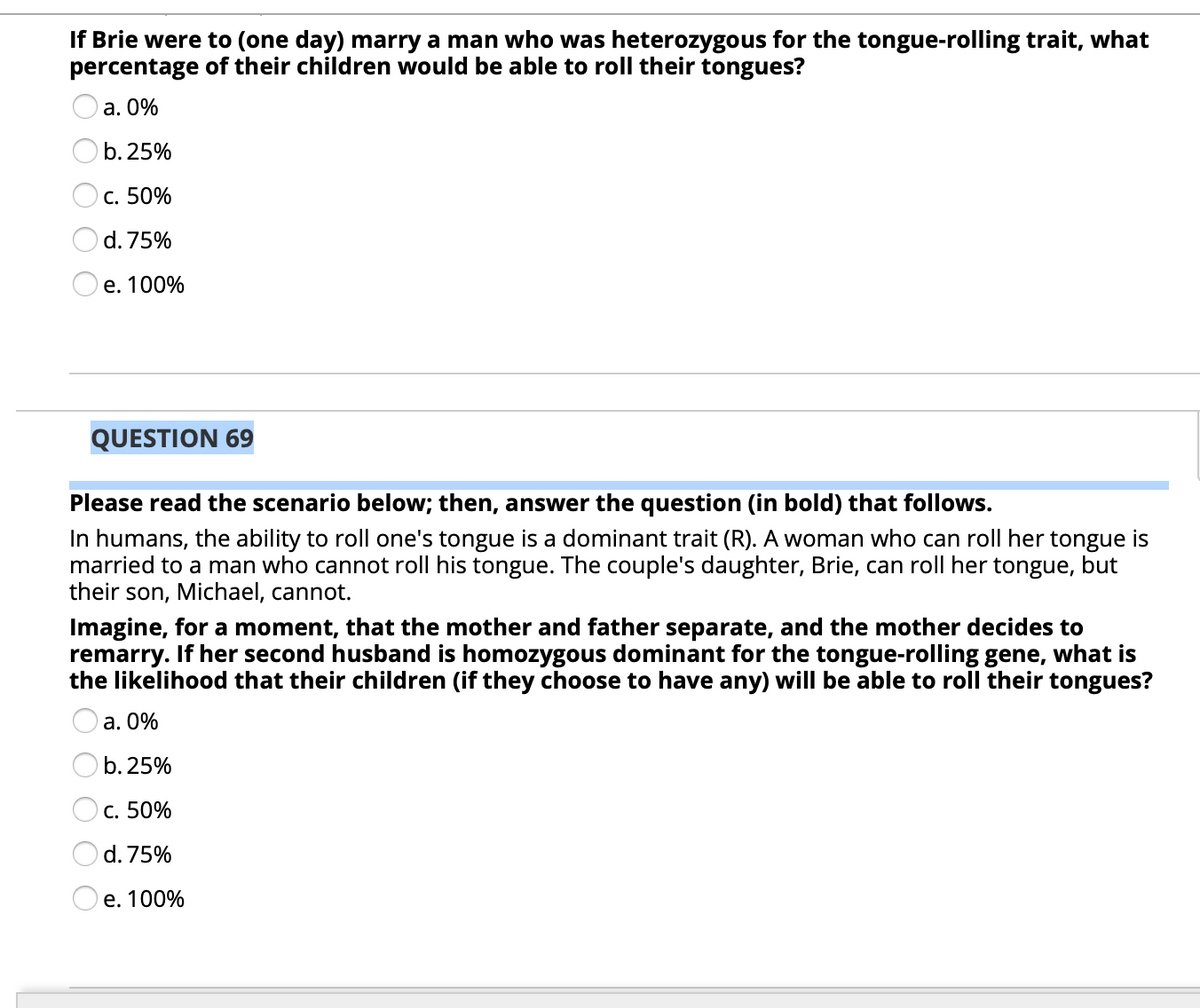If Brie were to (one day) marry a man who was heterozygous for the tongue-rolling trait, what percentage of their children would be able to roll their tongues? а. 0% b. 25% с. 50% d. 75% e. 100% QUESTION 69 Please read the scenario below; then, answer the question (in bold) that follows. In humans, the ability to roll one's tongue is a dominant trait (R). A woman who can roll her tongue is married to a man who cannot roll his tongue. The couple's daughter, Brie, can roll her tongue, but their son, Michael, cannot. Imagine, for a moment, that the mother and father separate, and the mother decides to remarry. If her second husband is homozygous dominant for the tongue-rolling gene, what is the likelihood that their children (if they choose to have any) will be able to roll their tongues? O a. 0% b. 25% c. 50% d. 75% е. 100%
If Brie were to (one day) marry a man who was heterozygous for the tongue-rolling trait, what percentage of their children would be able to roll their tongues? а. 0% b. 25% с. 50% d. 75% e. 100% QUESTION 69 Please read the scenario below; then, answer the question (in bold) that follows. In humans, the ability to roll one's tongue is a dominant trait (R). A woman who can roll her tongue is married to a man who cannot roll his tongue. The couple's daughter, Brie, can roll her tongue, but their son, Michael, cannot. Imagine, for a moment, that the mother and father separate, and the mother decides to remarry. If her second husband is homozygous dominant for the tongue-rolling gene, what is the likelihood that their children (if they choose to have any) will be able to roll their tongues? O a. 0% b. 25% c. 50% d. 75% е. 100%
Human Biology (MindTap Course List)
11th Edition
ISBN:9781305112100
Author:Cecie Starr, Beverly McMillan
Publisher:Cecie Starr, Beverly McMillan
Chapter19: Introduction To Genetics
Section: Chapter Questions
Problem 5CT: When you decide to breed your Labrador retriever Molly and sell the puppies, you discover that two...
Related questions
Topic Video
Question

Transcribed Image Text:If Brie were to (one day) marry a man who was heterozygous for the tongue-rolling trait, what
percentage of their children would be able to roll their tongues?
а. 0%
b. 25%
c. 50%
d. 75%
е. 100%
QUESTION 69
Please read the scenario below; then, answer the question (in bold) that follows.
In humans, the ability to roll one's tongue is a dominant trait (R). A woman who can roll her tongue is
married to a man who cannot roll his tongue. The couple's daughter, Brie, can roll her tongue, but
their son, Michael, cannot.
Imagine, for a moment, that the mother and father separate, and the mother decides to
remarry. If her second husband is homozygous dominant for the tongue-rolling gene, what is
the likelihood that their children (if they choose to have any) will be able to roll their tongues?
а. 0%
b. 25%
c. 50%
d. 75%
е. 100%
Expert Solution
This question has been solved!
Explore an expertly crafted, step-by-step solution for a thorough understanding of key concepts.
This is a popular solution!
Trending now
This is a popular solution!
Step by step
Solved in 3 steps

Knowledge Booster
Learn more about
Need a deep-dive on the concept behind this application? Look no further. Learn more about this topic, biology and related others by exploring similar questions and additional content below.Recommended textbooks for you

Human Biology (MindTap Course List)
Biology
ISBN:
9781305112100
Author:
Cecie Starr, Beverly McMillan
Publisher:
Cengage Learning

Concepts of Biology
Biology
ISBN:
9781938168116
Author:
Samantha Fowler, Rebecca Roush, James Wise
Publisher:
OpenStax College

Human Biology (MindTap Course List)
Biology
ISBN:
9781305112100
Author:
Cecie Starr, Beverly McMillan
Publisher:
Cengage Learning

Concepts of Biology
Biology
ISBN:
9781938168116
Author:
Samantha Fowler, Rebecca Roush, James Wise
Publisher:
OpenStax College